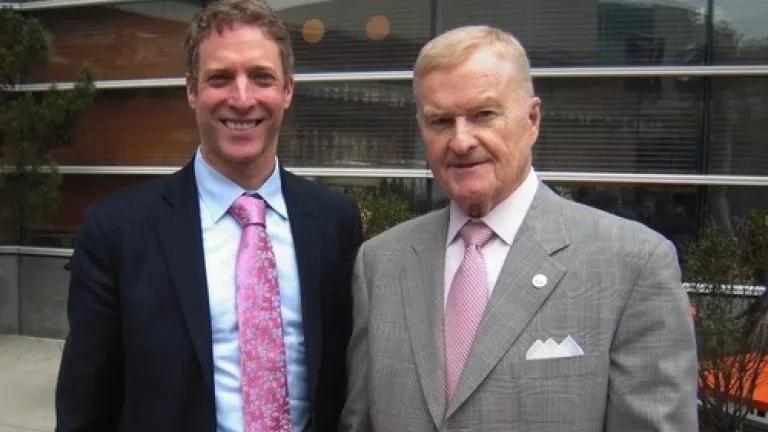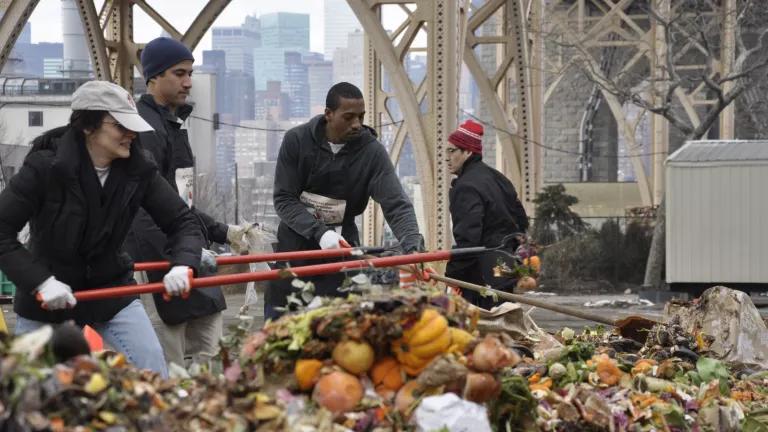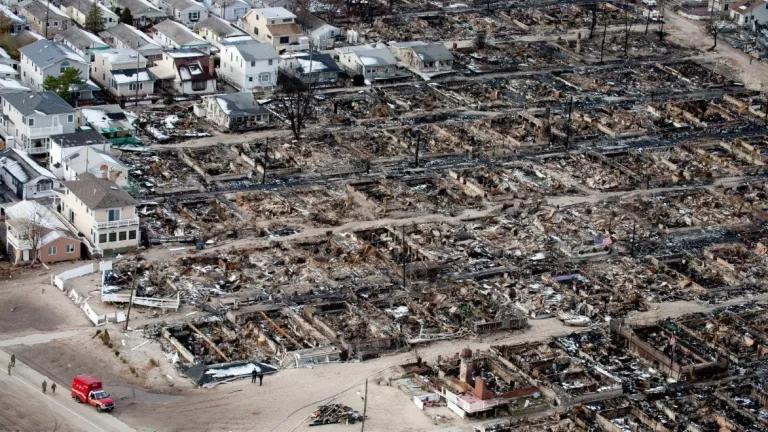
In a significant turnabout during his final year in office, New York City Mayor Michael Bloomberg is orchestrating a shift in solid waste policies that should improve the environment, reduce costs to taxpayers and strengthen the Mayor’s legacy on sustainability issues.
Overall, the Mayor has established an impressive track record on environmental matters over his three terms in office -- taking steps to reduce global warming emissions, expand green spaces and create new bike lanes and pedestrian plazas, among other accomplishments.
But recycling and waste prevention have, until recently, been a weak link in the city’s sustainability chain. Indeed, over the past twelve years, NYC residential recycling actually declined from a peak of 20% to just about 15%.
Now, however, the Administration is moving the city’s solid waste program in a new direction.
Mayor Bloomberg’s Sanitation Commissioner John Doherty, right, and Deputy Commissioner Ron Gonen, are moving to shift New York City waste policies in the Mayor’s final year in office, with a bold new emphasis on recycling and composting.
Here is a quick run-down on the most significant recycling initiatives that have been recently been announced or that are waiting in the wings:
First-Ever Deputy Commissioner for Recycling Appointed – Last May, Sanitation Commissioner John Doherty hired Ron Gonen to be the city’s first Deputy Commissioner for Recycling and Sustainability. Ron -- a bright, young entrepreneur who was the co-founder and CEO of RecycleBank -- was a perfect choice for the job. He opened up a dialogue with solid waste experts and environmental advocates. And, with critical support from Deputy Mayor for Operations Cas Holloway, Ron quickly began pushing forward with innovative recycling and composting strategies.
All Rigid Plastics to be Collected at Curbside – Mayor Bloomberg has announced that this summer the City will formally begin accepting all rigid plastics, “from salad containers to CD cases,” as part of its curbside recycling collection program. This long awaited step will remove a major source of confusion among New Yorkers regarding which plastics are supposed to be recycling and which are not. The new policy should boost participation and enhance the cost-effectiveness of the city’s recycling collections.
Phase Out of Polystyrene Food Containers Proposed – The Mayor, in his State-of-the-City address, confirmed that his Administration is moving to prohibit the dispensing of polystyrene take-out food containers in stores and restaurants. Polystyrene foam never biodegrades, is extremely difficult to recycle and because it is brittle and breaks into tiny pieces once it is thrown out, is a major contributor to litter on city streets, parks and beaches. As the Mayor noted, polystyrene foam also increases the costs of the city’s recycling program and of litter clean-up in New York. Many restaurants and take-out establishments have already substituted other more recyclable or compostable food containers for polystyrene products and, with leadership from City Council Speaker Chris Quinn anticipated, the polystyrene phase-out could become law later this year.
Recycling Receptacles Added to Busy City Street Corners – The Mayor’s proposed FY ‘14 budget commits four million dollars to continue to expand the number of recycling receptacles on city streets; the Mayor has announced plans to add 1,000 new recycling containers for paper, bottles and cans in 2013. And just last month, the city, in partnership with BigBelly Solar and Alcoa Foundation, launched a new pilot project that has brought 30 new solar powered trash and recycling receptacles to Times Square; the self-compacting receptacles hold five-times the trash of traditional sidewalk waste bins and should help reduce collection costs.
New Electronics Waste Recycling in Participating Apartment Houses – According to Sanitation Commissioner John Doherty, the city will commence a new, cost-free electronics recycling program this summer. Apartment houses in all five boroughs can enroll in the program, in which a recycling service will arrange to collect e-waste at each building -- at no cost to the landlords or tenants. If successfully implemented, this program will make it much more convenient for consumers to recycle old computers and televisions, while taking some of the most toxic consumer products out of the household waste stream.
Textiles Recycling Collections to Expand in Participating Apartment Houses – City Sanitation Commissioner John Doherty pledged at a recent City Council budget hearing that the Department would expand recycling of textiles and used clothing. The current textile recycling initiative, operated by the non-profit Housing Works, is only collecting in just over 200 buildings and has failed to hit critical mass. The Department is now planning to expand this program to additional buildings and public spaces across the city, although the details have not yet been publicly announced.
Food Waste Composting Pilot Projects Premiere in Manhattan and on Staten Island – Last week, the Sanitation Department and the Durst Organization announced the first curbside food waste collection demonstration in a New York City apartment building -- at The Helena on Manhattan’s West Side. The Sanitation Department is collecting food waste from the 600-unit building as part of its regular food waste collection runs to nearby city schools, significantly reducing collection costs. In another pilot project, the Sanitation Department is planning this summer to begin curbside collections of food waste from participating private homeowners on Staten Island. Since food scraps and yard waste account for more than 20% of the residential waste stream, this demonstration -- in addition to the environmental benefits of composting or converting food waste to energy -- holds the potential, if expanded citywide, of dramatically reducing taxpayer costs of exporting such trash to distant landfills.
Recycling and Composting in 1,200 Public Schools – Beginning in September, the city’s public school system – which for years has been lagging on recycling – is expected to take a great leap forward. The plans are to begin collecting food waste from lunchrooms at all public schools, and to take further steps to insure that all public schools obtain enhanced paper recycling collections as well. If the Sanitation Department and Department of Education can finally implement across-the-board recycling and composting in all city school buildings, it will close one of the most significant gaps in the city’s recycling operations.
State-of-the-Art Processing Facility for Recyclables Set to Open This Summer – The Mayor has announced that the long-awaited Sims recycling facility – which is expected to be one of the largest household recycling plants in North America -- will open on Brooklyn’s Sunset Park waterfront this summer. The new facility will sort metals, glass and plastics, and mixed paper collected by City Sanitation trucks; it will contain a state-of-the-art educational center and create over 100 permanent green jobs.
Recycling Can Save Tax Dollars, Mayor Says – Since the closure of the city’s last waste dump (the Fresh Kills landfill on Staten Island), the cost of trash disposal has skyrocketed. Most of New York City’s trash travels to out-of-state landfills in Ohio, Pennsylvania, South Carolina and Virginia. In FY ’14, city taxpayers will be spending over 330 million dollars to cover the costs of landfilling at this facilities. Such circumstances have led Mayor Bloomberg to recently conclude: “Landfills cost us a lot of money. If we could recycle a lot of stuff, it would be much better for the environment and better for our bottom line.”

Food waste composting pilot projects are beginning for the first time in New York City this year, including a demonstration project at The Helena, pictured above, where tenants in this 600 unit building are separating their food scraps and the Sanitation Department is picking up this waste as part of its expanded collections at local schools.
To be sure, New York City has a long way to go before it can claim the title of national municipal leader on recycling.
Indeed, the next Mayor will have to be very active in the waste area just to insure that the proposed changes described here are successfully implemented. Other important issues that inevitably await 2014 include boosting the percentage of paper collected in the city’s residential recycling program, increasing recycling collections in neighborhoods with low participation rates and reforming the city’s recycling collection system to enhance its cost-effectiveness.
Nevertheless, the final eight months of the Bloomberg Administration could mark one of the most significant episodes in recent decades in terms of advancing more sustainable waste-handling practices in the nation’s largest city.




